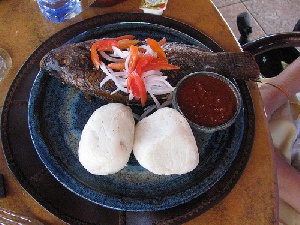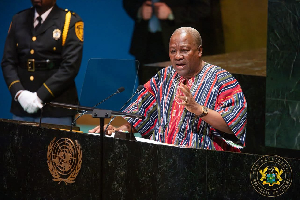.... due to high import tariffs
Despite recent warnings by the United Nations that world food prices will continue to rise, Ghana led by the John Mills administration remains the only country in the world that has increased import levies on food.
The move by the NDC administration according to dealers in food produce gives the opportunity to an imminent disaster that should be curtailed with proactive measures.
The Minister of Finance decided to restore the import duties on rice, oil and maize in the 2010 budget. In presenting his statement to parliament the Finance Minister claimed,” The global conditions that necessitated the removal of those duties have abated and government finds it pertinent to restore the duties in order to encourage local production, create jobs and conserve foreign exchange."
Minister Kwabena Duffuor indicated further in the budget statement that “This development is not just welcome news and an incentive to our local farmers but also fits into the social democratic values of this government."
However according to the Food and Beverage Association (FABAG), the action which was taken by the current administration consequently will put the lives of many Ghanaians in jeopardy, thus endangering the very survival of the ordinary man on the street.
The group said high import levies on food produce will threaten the livelihoods of Ghanaians who risk being rendered jobless if the unbearable situation does not seize since the situation will subsequently kill local business.
Mr John Awuni narrated that the Minister arguably gave good reasons for the restoration of the taxes but research by FABAG recent times totally defeats the Finance minister’s action.
He elaborated that aside other goods smuggled into the Country, currently Ghana is losing about $40million annually as a result of rice alone smuggled from Cote d’ Voire.
Generally sales by legitimate rice (both local and imported) and oil importers have dropped by 25% since the beginning of the year 2010.
“The smuggled quantity in the case of rice account for almost one-third of the total annual rice consumption which is a big revenue loss to the government of Ghana”, FABAG spokesperson John Awuni intimated while addressing the news media.
Indeed, out of 100,000MT that gets smuggled, 75,000MT is the high value perfumed rice. The commonest brand smuggled into the country is Uncle Sam rice.
The red flags have been raised by the UN Food and Agricultural Organization (FAO), which says that world food prices have risen to their highest level in two years.
In a recent report released on Wednesday September 1, 2010, it says the increase is due partly to a drought in Russia and to government export restrictions which have brought about a surge in the price of wheat.
The Rome-based agency says that its food price index shot up 5% between July and August.
Ghanaians according to the Industry experts will not escape the wrath of the UN’s projection since is a global phenomenon and thus Ghanaians shall continue to suffer the painful effects of increase in import duties if the Mills administration does not act immediately to control the situation.
Already the prices of some basic food produce keep soaring endlessly due to unfair tariffs regimes between Ghana and its West African Counterparts.
Food and beverages dealers have predicted that as food production continue to decrease due to the coast of production, smugglers will continue to take advantage of the huge disparities in import duties between Ghana (37 percent) and her neighbours (12.5 percent) thus ordinary Ghanaians who spend about 70 percent of their income on food should be ready to spend even more.
Presenting the fact at a news conference today, Thursday 2nd September 2010), as to why the Ghanaian consumer is at risk, John Awuni elaborated that the Minister of Finance decided to restore the import duties on rice, oil and maize in the 2010 budget.
The press briefing by FABAG which was a follow up to a Daily Graphic story on how the nation is massively losing a whopping 40 million dollars a year, enumerated many challenges facing food and beverages dealers nationwide.
FABAG which is a major mouth piece of stake holders in the Food and beverages industry have been in the fore front to urge governments to check food smuggling, intend to use the media to undertake a massive campaign to sensitize the public on smuggling of goods thus urging consumers to expose smugglers.
Consequently Nabil Mourkazel who is also a member of the Food and Beverages Association of Ghana (FABAG) says the group’s focus is not only on rice smuggling.
“Let’s not focus only on rice, the issue is not only rice, we’ve got oil, tomatoes and other beverages, we focus on rice today because is one of the major food produce people are interested in, but the reality is that rice is not the only thing being smuggled to Ghana. There are a lot of things”, Mr. Nabil told journalists.
C













